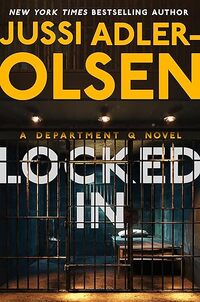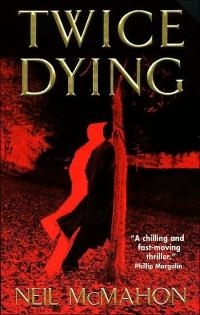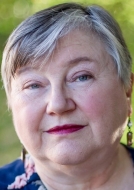 LOCKED IN |
 Sunshine, secrets, and swoon-worthy stories—June's featured reads are your perfect summer escape. |

Purchase
HarperTorch Thriller Excerpt of Twice Dying by Neil McMahonChapter One The emergency room at San Francisco's Mercy Hospital I was mid-range, with fifteen beds and Level 11 trauma capability, equipped to handle whatever came through the doors as long as there was not too much of it at once. Business was usually brisk, and the general degree of tension moderate. Death was not common, although when it did come it tended to happen quickly. This was a fact that Carroll Monks never lost sight of. The evening had been crisis-free, and Monks was allowing himself a break, in the faint hope that things would stay that way. His gaze caught the raised hand of Leah Horvitz, the ER's charge nurse, beckoning him. He walked to the admitting desk. "A woman just left a phone message for you," Leah said. "She asked you to go look in your car." "In my car? My car is locked, Mrs. Horvitz." "I'm just repeating the message." "That's all? She didn't leave a name?" "She said you'd know." "Did she hit my vehicle?" "If she did, Doctor, I'm sure she came out second best." Monks caught grins on the faces of staff within hearing range. "I'll ignore that, Mrs. Horvitz. All right. I'll be back in a minute." It was a damp night, mid-November, with fog rolling in, high thin clouds that might or might not burn off with tomorrow's sun. Monks walked through the parking lot with vague apprehension, possibilities turning in his mind: a prank, a setup for a mugging, a disgruntled patient who had planted a bomb. His vehicle, a 1974 Ford Bronco made of old-fashioned Detroit iron and the heart of a Percheron, was parked in the physicians' section. As usual, the nearby Saabs andLexuses had given it a wide berth. There were no signs of a collision. But a white gift box, a little bigger than a deck of cards, rested on the driver's seat. Monks tried the door. It was locked, the way he had left it. He turned slowly, his gaze searching the parking lot. There were no other human beings in sight. He opened the door and cautiously picked up the box. It had a good weight, the feel of something solid. He scanned the parking lot again, then took off the lid. Inside was an antique straight razor. Its smooth-worn ivory handle was inlaid with a silver caduceus: the winged staff with two entwined snakes, symbol of the medical profession. It was easy to imagine as a prized possession of a doctor from an older generation. Easier yet to think of the only other person who still had keys to things of his. Six years ago, a psychologist named Alison Chapley had been called in to consult on a case with a malpractice insurance group which Monks worked for as expert witness/consultant/investigator. She was very attractive, very sharp, and more than ten years younger than he. The richness and promise of her life seemed apparent, and it never occurred to him that she might see him as anything but an amusing curmudgeon. One Friday afternoon, he had walked out of the company's offices on Montgomery Street and found Alison waiting, leaning back against the building in a pose he would come to know well, one hand cupping the other elbow, cigarette held between two fingers. He said, "Could I give you a ride someplace?" "I think you're a cripple, Dr. Monks." Monks blinked in astonishment, then set his jaw. "Is that a free diagnosis, Dr. Chapley?" "It's never free. What do you like?" "I'm not sure what you mean." "You know what I mean." She pushed away from the wall and handed him a business card with an address hand-written on back. "Drop by. Tomorrow would be fine." Her house was near Bolinas, secluded from its neighbors, on a low bluff overlooking the Pacific. Her car was there, but she did not answer the door. Monks hesitated, but then stepped inside and walked through, calling her name. A pair of French doors opened onto a deck. He saw that she was sunbathing in a lounge chair, her back to him. He did not realize she was nude until he said hello, and she leaped to her feet, gasping, hands flying to cover herself. Monks said, "You shouldn't leave your door unlocked. Anybody could come walking in." Beneath the sheen of oil she was flushed-vibrant, he would realize later, from the drug XTC. "I like surprises," she said, and let her hands fall to her sides. Alison had surprised him many times after that: sometimes by leaving a gift in his vehicle. He began to glean that each one had a significance that only she understood. A photograph. A book. A spike-heeled shoe. A black silk scarf, embroidered with gold. The parking lot's argon lights, blurred and diffused by fog, colored the night a garish pink-orange, bringing to mind his ticket home from eight months of war: falciparum malaria, tiny mosquito-borne protozoa that invaded the liver and burst forth to storm the bloodstream, killing a million human beings per year and forcing fevered delirium on hundreds of millions more. He remembered his last vision of Alison, burned into his mind through a fierce haze of vodka on a night he could almost believe was one of those hallucinations: his hands tightening that scarf around her throat, urging her slowly and not ungently to the floor beneath him, with her choked sounds that might have been fear, or pleasure, or laughter. That had been five years ago. He had not seen her or spoken to her since. Monks gazed into the night with the dense weight of the razor clasped in his palm, rubbing the smooth ivory between thumb and forefinger, as if it were a talisman that could help him see into the reason behind this new offering. Excerpt from Twice Dying by Neil McMahon |
|
| |||
|
||||



 © 2003-2025
© 2003-2025